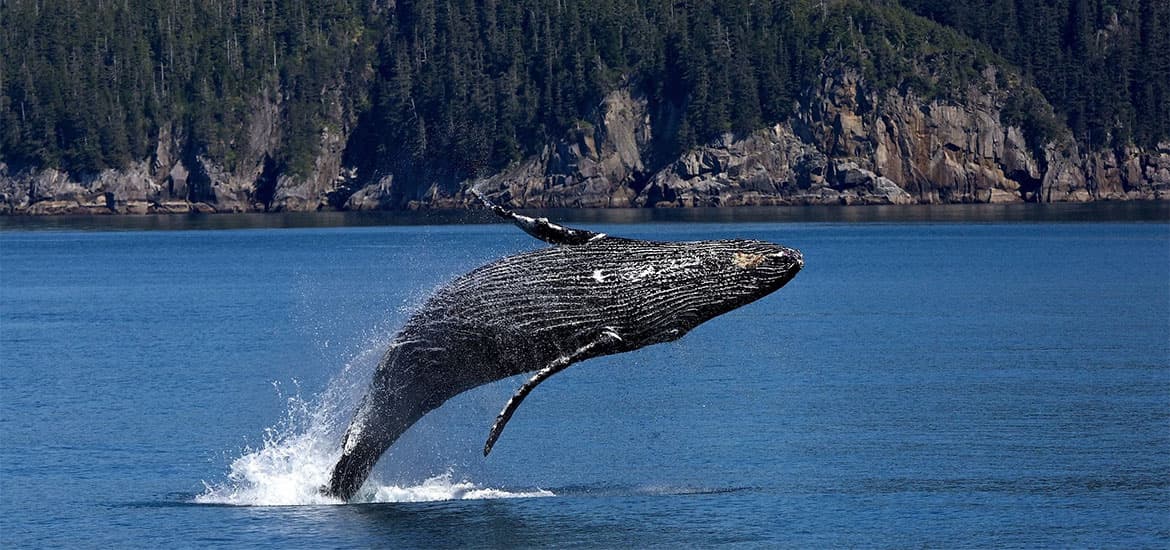New research reveals small fish beat ocean giants in speed and power jumping out of water
- Tuesday, February 11, 2020
New research by the University of Roehampton has revealed how small fish, such as mackerel, can jump out of the sea - a behaviour known as 'breaching' - at the same maximum speed as humpback whales, and how the breaching powers of mullets can match apex predators like the great white shark.

The study, published in the Journal of Experimental Biology, was led by Professor Lewis Halsey from the University of Roehampton’s Department of Life Sciences, and provides vital new information on how speed and power of breaching scales with animal size. Professor Halsey, who worked with Dr Gil Iosilevskii from Technion – Israel Institute of Technology - evaluated hours of detailed video archives of 14 species of fish and cetaceans* spanning in length from 20 centimetres to 14 metres and devised complex mathematical equations to reach the fascinating results.
The findings display how the maximum breaching speed of fish and cetaceans increases with size until it begins to plateau with species that are around 2 m long, and the speeds of far bigger cetaceans such as orcas and humpback whales do not surpass that of the 1 m mackerel. To put this in figures, both mackerels and humpback whales have a similar maximum speed when jumping out of the water (9 metres per second, m/s), and mullets and white sharks are also matched for breaching speed (6 m/s) The common bottlenose dolphin exhibits the highest maximum speed of all the species analysed, at around 11 m/s.
When it comes to the power generated by the different species during breaching, smaller fish were found to deliver higher rates of energy output for their size. For example, the power of a mullet as it thrust through the water surface, a fish typically less than 50 cm long, is about 40 Watts per kilogram of body weight (W/kg), which is 10 times more power than exhibited by the great white shark. Indeed, all of the smaller fish in the analysis, from the 20 cm Congo tetra up to the metre-long mackerel, show maximum power levels during breaching of around 40 W/kg.
Species greater than about 1 m in length show progressively lower power productions for their mass. This suggests that pound for pound the maximum power exerted by any breaching species is around 40 W/kg, potentially representing a power ceiling for any swimming species going flat out. Indeed, these maximum power values may well represent the top-end power production of any species under any situation – breaching, swimming, running or flying. To put this figure into context, a breaching 10 kg mackerel is producing as much energy, or heat, as 4 brightly burning lantern candles.
Lead author of the study, Professor Lewis Halsey, University of Roehampton, said: “These findings provide an important insight into the physical capabilities of aquatic animals and how their speed and power output relates to their size. There are general expectations that powerful animals known to hunt, such as orcas or great white sharks, would come out top in terms of maximum speed, but our results disprove this.
“We hope this will form the foundations for further research as we discover more about the maximum energy outputs of different animals and the underlying factors impacting this fundamental measure of an animal’s physical capacity and how they are adapted to their habitats.”
The Department of Life Science delivers world class research which impacts lives and furthers our understanding of science. It offers undergraduate degrees in Zoology alongside a number of undergraduate and postgraduate degrees. The full study can be accessed on the Journal of Experimental Biology.
*14 species of fish and cetaceans spanning in length from 20 cm to 14 m were analysed as part of the research. These include: the African tetra, basking shark, common bottlenose dolphin, Gulf sturgeon, harbour porpoise, humpback whale, mackerel (kingfish), mako shark, mobulid ray, mullet, orca (Killer whale), silver carp, spinner dolphin and white shark.